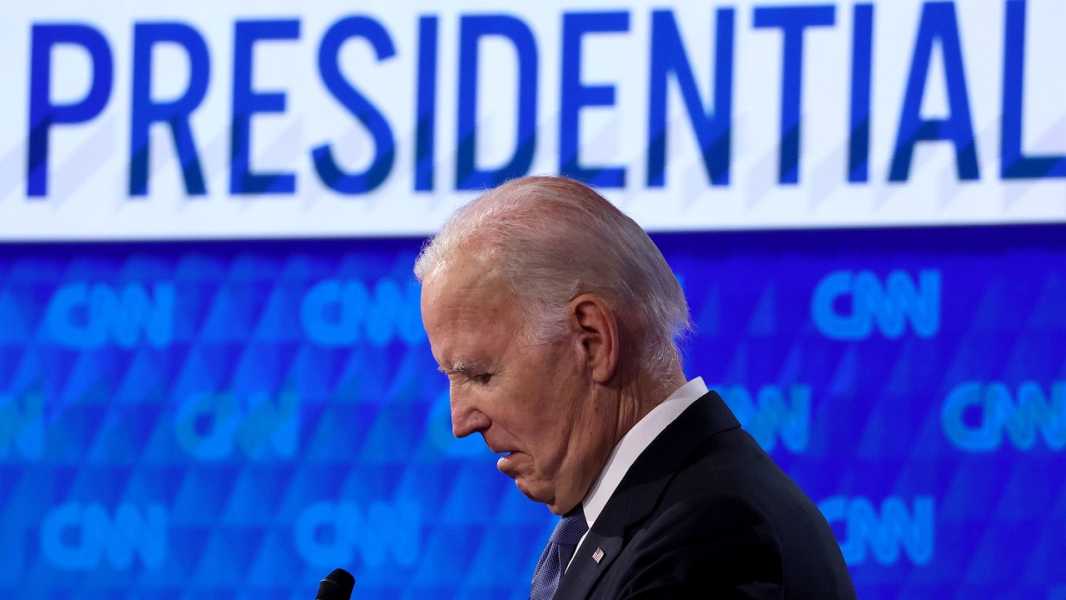
Save this storySave this storySave this storySave this story
The next-day freakout, livid as the most regrettable hangover, over President Joe Biden’s performance in Thursday night’s debate, has largely focussed, understandably, on words. Too many times, Biden’s sentences meandered outward in odd ellipses from the center of their meaning, or petered out softly like a kite losing wind. He talked inanely about Roe v. Wade having “three trimesters.” After a Biden answer about border security, his opposite number, Donald Trump—as ever, a creep—told one of the only truths that passed his lips all night: “I really don’t know what he said at the end of that sentence. I don’t think he knows what he said, either.” It’s inescapable: syntax, often a challenge for Biden, even in his younger years, betrayed him at the debate.
The true locus of Biden’s humiliation on CNN, however, was not words but the series of sorry pictures he made with his face. Long after his misbegotten locutions are forgotten, I will remember the lost, misty mooniness in Biden’s eyes. When Trump was speaking—always an opportunity for his opponent to convey a frank, relatable disbelief at the stream of lies that inevitably pours forth—Biden’s face was often frozen: wide eyes, vague expression, slack mouth. He looked like he’d just remembered something of drastic domestic importance—the combination to the safe in his bedroom closet, the location of a lost key—and was in the process of forgetting it again. When he spoke, he seemed almost surprised—those eyes again!—to be hearing the hoarse sound of his own voice.
Hoping to soak in the impressions of others, I watched most of the debate at a bar in downtown Manhattan, surrounded by friends. Even when the crowd or the music got loud and the words got hard to catch, I could hear groans wafting toward the screen every time Biden appeared. Sometimes he’d gather his strength to pantomime shock at or disagreement with something Trump had said; in these moments, he’d raise his brows a centimetre or two and stretch his features backward, toward his ears—this made his nose look sharper and his eyes disappear into long, thin em dashes. It wasn’t the look he was going for, I don’t think. Biden prepared assiduously for the debate at Camp David. But he needed someone in a nearby room, watching over a monitor, sound muted, jotting down notes solely on his face.
Of course, it’s possible, given Biden’s age, that there is some simple explanation for his facial trouble. Some observers mentioned “masked face,” a symptom of Parkinson’s characterized by decreased facial expressiveness. But, absent a diagnosis, we are left with a possible fate: everybody knows by now that Biden’s performance has damaged his prospects against Trump, perhaps irrevocably.
It’s true that television can unduly simplify, making appearances take on the false impression of absolute truth. And it’s true, too, that punditry based on images can cheapen an already superficial political culture, substituting surface for substance. But the office in question, the American Presidency, has evolved specifically to be an engine for the production of powerful images, a place where visual culture proves its worth as a generator of soft power. Ever since the famous first televised debate—a sweaty, anxious-looking Richard Nixon against the naturally telegenic John F. Kennedy—this weird ritual of in-person retort has been as much pageantry as visual-verbal. Much of the job of getting the job entails looking the part—whatever the part is—and an enfeebled face, lost to its own effects, isn’t going to be any help as a tool in this already quite depressing campaign.
Speaking of depression: maybe the worst of Biden’s facial tendencies during the debate were on display whenever he looked downward solemnly, perhaps mulling the political disaster that was unfolding onstage. In one Getty photograph, taken in profile, Biden seemed to be looking directly at the microphone a few inches from his face. The skin of his chin bagged slightly, forming a loose balloon that drooped over his collar. His thin white hair shone under the TV lights that had treated him so unkindly. His eyes looked sad. He could’ve been looking at the mike, contemplating it as a symbol of the media apparatus that potentially stood in the way of his great goal, reëlection, and would soon savage him. Maybe he could already hear the calls for him to step aside. Or maybe he was just gathering his thoughts.
He might have been thinking about the inherent unfairnesses of the political system whose treacherous slope he’d climbed so slowly, over so many years: Look, you might send prices soaring; or enable a war so heinous that most observers can barely stand to look at the pictures—images, so inconvenient!—that emerge from the fray; or be outmaneuvered, over and over, by political foes foreign and domestic; on and on. In this, Biden is no exception. Almost every President does it! But, if you look O.K., the public might just let it slide. If not, then . . . well, good luck. ♦
Sourse: newyorker.com